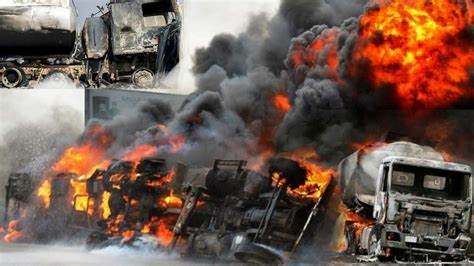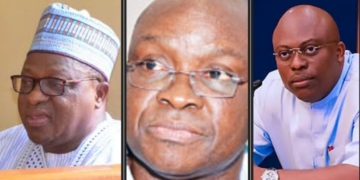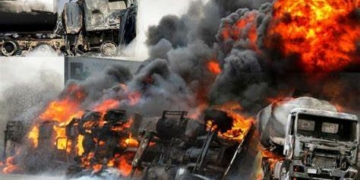The country was thrown into tragedy on October 17th, as a petrol tanker explosion killed scores of people and injured many others. Media reports currently estimate the death toll at 166, and this number continues to rise daily.
Within Nigeria gathered that the accident occurred at midnight in Majiya town, northern Jigawa State, when the tanker driver lost control on a highway. Residents rushed to the scene to scoop petrol before the tanker exploded.
ariThis devastating event follows a 15% increase in petrol prices, further plunging the country into hardship. The Nigerian National Petroleum Company Limited (NNPCL) recently raised the pump price of Premium Motor Spirit (PMS), commonly known as petrol, by 15%, from ₦897 per liter to ₦1,030 per liter. This marks the fourth increase since Bola Tinubu came to power.
In a press statement, the Federal Road Safety Corps (FRSC) commiserated with the victims and explained that the fire was ignited when villagers rushed out to scoop fuel from the detached tanker of a DAF vehicle about an hour after the crash. The Corps directed commanding officers to expedite actions ensuring all tankers meet minimum safety standards before transporting flammable substances.
A similar accident occurred in September, killing at least 48 people. That incident took place along the Bida-Agaie-Lapai Road in Niger State, when a petrol tanker collided with a trailer truck carrying travelers and cattle from Wudil in Kano State, en route to Lagos. At least 48 people lost their lives, with many others injured, and around 50 cows died on the spot.
These events have led to the deaths of more than 190 people, raising concerns about the state of tankers plying Nigerian roads.
According to Timothy Iwuagwu, president of the Institute of Safety Professionals of Nigeria, one major cause of such accidents—and the resulting explosions—is that many petrol tankers are not designed according to international best practices.
In 2020, more than 500 people died from about 1,500 tanker accidents, according to the FRSC.
Efforts to Prevent Recurring Accidents
The Minister of State for Petroleum Resources (Oil), Senator Heineken Lokpobiri, directed the Nigerian Midstream and Downstream Petroleum Regulatory Authority (NMDPRA) to investigate the tragic petrol tanker explosion that occurred in Jigawa State.
In a recent meeting with the Corps Marshal of the FRSC, Shehu Mohammed, in Abuja, Lokpobiri noted that the government is exploring technological solutions to secure pipelines against vandalism and support the operation of local refineries.
He reiterated the importance of reducing Nigeria’s dependence on road transport, which has contributed to the frequent tanker-related accidents, but added that replacing tankers with alternative transport options is extremely capital-intensive.
President Bola Tinubu has also called for a swift and comprehensive review of safety protocols for the transportation of gasoline, adding that this review will be carried out in partnership with various state authorities and that offenders of the new regulations will be punished. However, it is not yet clear what the review of these safety protocols will entail.





Discussion about this post